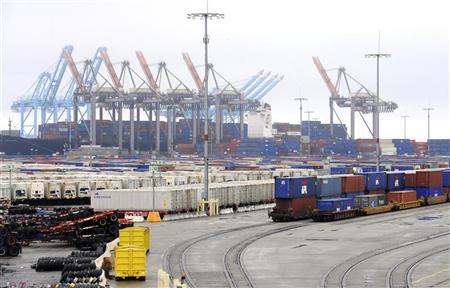So this is fun.I was listening to NPR the other morning, and they were saying that
the repugicans are livid that President Obama stuck to his guns on his
“fiscal cliff” offer regarding phasing out the tax cuts for the rich.
You see, NPR explained, the repugicans figured the President would
make an offer, then start negotiating with himself, undercutting his own
position, while the repugicans just sat back and watched.
But a funny thing happened this time. He didn’t. The President is
sticking to his guns and demanding the repugicans let the shrub tax cuts for the
rich expire. And Democrats are pleasantly surprised to be able to say,
“now that’s the guy I voted for.”
It shouldn’t be a surprise in principle that the President is
standing up to the repugican cabal. The President won the election, and he was
quite clear throughout that if he was re-elected, he’d get rid of the shrub tax cuts for the rich.
What’s probably motivating the White House more are the polls.
Not only have recent polls shown that a large majority of Americans,
67%, want tax increases included as part of the budget deal, but even repugicans support the notion 52-44, and even wingnut repugicans
are on board, 51-45. That means, congressional repugicans don’t even
represent wingnuts in their party, let alone the rest of their
party or the rest of the nation.
And the President knows it, and he’s playing it. The poll also
showed that the public at large, and independents in particular, would
blame the repugicans more than the President if the talks fail.
Now, the President has had polls on his side before, and not quite
seemed to have taken full advantage of them. Back in 2010, the polls
were showing that the public wanted Washington to cut the deficit, keep entitlements and tax the rich.
The public wants Congress to keep its hands off
entitlements such as Medicare, Medicaid and Social Security, a Bloomberg
National Poll shows. They oppose cuts in most other major domestic
programs and defense. They want to maintain subsidies for farmers and
tax breaks like the mortgage-interest deduction. And they’re against an
increase in the gasoline tax.
Peter Baker in the NYT has a delicious “news analysis” of the current
standoff entitled, “Pushing G.O.P. to Negotiate, Obama Brings End to
Giving In.”
Obama brings end to giving in. Imagine that.
Mr. Obama, scarred by failed negotiations in his first
term and emboldened by a clear if close election to a second, has
emerged as a different kind of negotiator in the past week or two,
sticking to the liberal line and frustrating repugicans on the other
side of the bargaining table.
Disciplined and unyielding, he argues for raising taxes on the
wealthy while offering nothing new to rein in spending and overhaul
entitlement programs beyond what was on the table last year. Until repugicans offer their own new plan, Mr. Obama will not alter his. In
effect, he is trying to leverage what he claims as an election mandate
to force repugicans to take ownership of the difficult choices ahead.
His approach is born of painful experience. In his first four years
in office, Mr. Obama has repeatedly offered what he considered
compromises on stimulus spending, health care and deficit reduction to repugicans, who either rejected them as inadequate or pocketed them and
insisted on more. The repugicans argued that Mr. Obama never made serious
efforts at compromise and instead lectured them about what they ought to
want rather than listening to what they did want.
You know what? Bite me. The repugicans long ago taught themselves
that lying is the best medicine. The only way to win over the public,
the repugican cabal figured, was to lie to them. That’s why they created Faux News.
And it’s why they regularly lie about science (be it climate change or evolution),
and pretty much every position they hold. Tax cuts won’t balloon the
deficit. Iraq really has WMD (and the war will be a snap). Gay
marriage will force straight men to divorce their wives. And the
President has always refused to compromise with repugicans.
When has the President ever refused to compromise with repugicans?
If anything, Democrats have been annoyed with the President’s seemingly
endless efforts to compromise with both Republicans and himself. The
stimulus was a compromise (and then the repugicans voted against it
anyway). Health care reform was as compromise (and then the repugicans
pretended it was a federal takeover of health care when it wasn’t).
Backing off of climate change was a compromise. Proposing off-shore
drilling was a compromise. When hasn’t this President compromised?
Though, the President’s compromises did become less
compromising
in the last two years of his first term, as he grew to fully appreciate
how duplicitous the repugicans really were. So now, he’s actually
standing up to them, full bore, and they don’t like it one bit.
This is what the President refused to do at the beginning of his
first term – use his electoral mandate, use the polling in his favor,
and fight from a position of strength for what he thinks is right.
Oh, and I read that the President is also demanding that repugicans
let Medicare negotiate drug prices with Big Pharma, so that we can stop
paying the exorbitant 300% to 500% mark-up that Big Pharma charges
Americans to help pay for subsidized drug prices in Europe. If the
President is serious about this, this is a battle, even in the face of
Big Pharma big money, that he can win (good luck explaining to the
American people why they, and their government, should continue to pay
5x the price for Advair in order to subsidize cheap prices in France).
Now, will he hold firm? I dunno. And to some degree, that’s our job
to help hold him firm. But having the President recognize his own
strengths in this negotiation is a darn good beginning to a second term,
and it’s just the change I’ve been needing.









 This
[photograph of a policeman behind a riot shield] was taken at about 6
pm last night, shortly after protesters were giving carnations to police
officers stationed in front of Parliament. About four hours later
police used a water cannon in Slovenia for the first time.
I’m sick as a dog and didn’t stay in the chill and drizzle for very
long, so this is a rundown based mostly on local press accounts of what
was, somewhat astonishingly, the second demonstration in a week here in
Slovenia to turn violent.
This
[photograph of a policeman behind a riot shield] was taken at about 6
pm last night, shortly after protesters were giving carnations to police
officers stationed in front of Parliament. About four hours later
police used a water cannon in Slovenia for the first time.
I’m sick as a dog and didn’t stay in the chill and drizzle for very
long, so this is a rundown based mostly on local press accounts of what
was, somewhat astonishingly, the second demonstration in a week here in
Slovenia to turn violent.

 The GeoSpring suffered from an advanced-technology version of “IKEA
Syndrome.” It was so hard to assemble that no one in the big room wanted
to make it. Instead they redesigned it. The team eliminated 1 out of
every 5 parts. It cut the cost of the materials by 25 percent. It
eliminated the tangle of tubing that couldn’t be easily welded. By
considering the workers who would have to put the water heater
together—in fact, by having those workers right at the table, looking at
the design as it was drawn—the team cut the work hours necessary to
assemble the water heater from 10 hours in China to two hours in
Louisville.
The GeoSpring suffered from an advanced-technology version of “IKEA
Syndrome.” It was so hard to assemble that no one in the big room wanted
to make it. Instead they redesigned it. The team eliminated 1 out of
every 5 parts. It cut the cost of the materials by 25 percent. It
eliminated the tangle of tubing that couldn’t be easily welded. By
considering the workers who would have to put the water heater
together—in fact, by having those workers right at the table, looking at
the design as it was drawn—the team cut the work hours necessary to
assemble the water heater from 10 hours in China to two hours in
Louisville.









